Course Descriptions
All Courses are 2 hours unless otherwise noted
* Denotes a Core Course in which all groups participate
All Courses are 2 hours unless otherwise noted
* Denotes a Core Course in which all groups participate
The EBOA offers a wide variety of NGSS courses and is committed to working with each school to ensure each individual’s needs are met. Below is a list of the various modules that we offer. To build your own adventure, please fill out our Interest Form.
Please select your Courses on your Program Planner found in Planning Tools. All groups will participate in our three Core Courses: Island Biogeography, Kelp Forest Exploration and Environmental Stewardship. 5-Day Programs will also have the Parsons Hike as a Core Course.
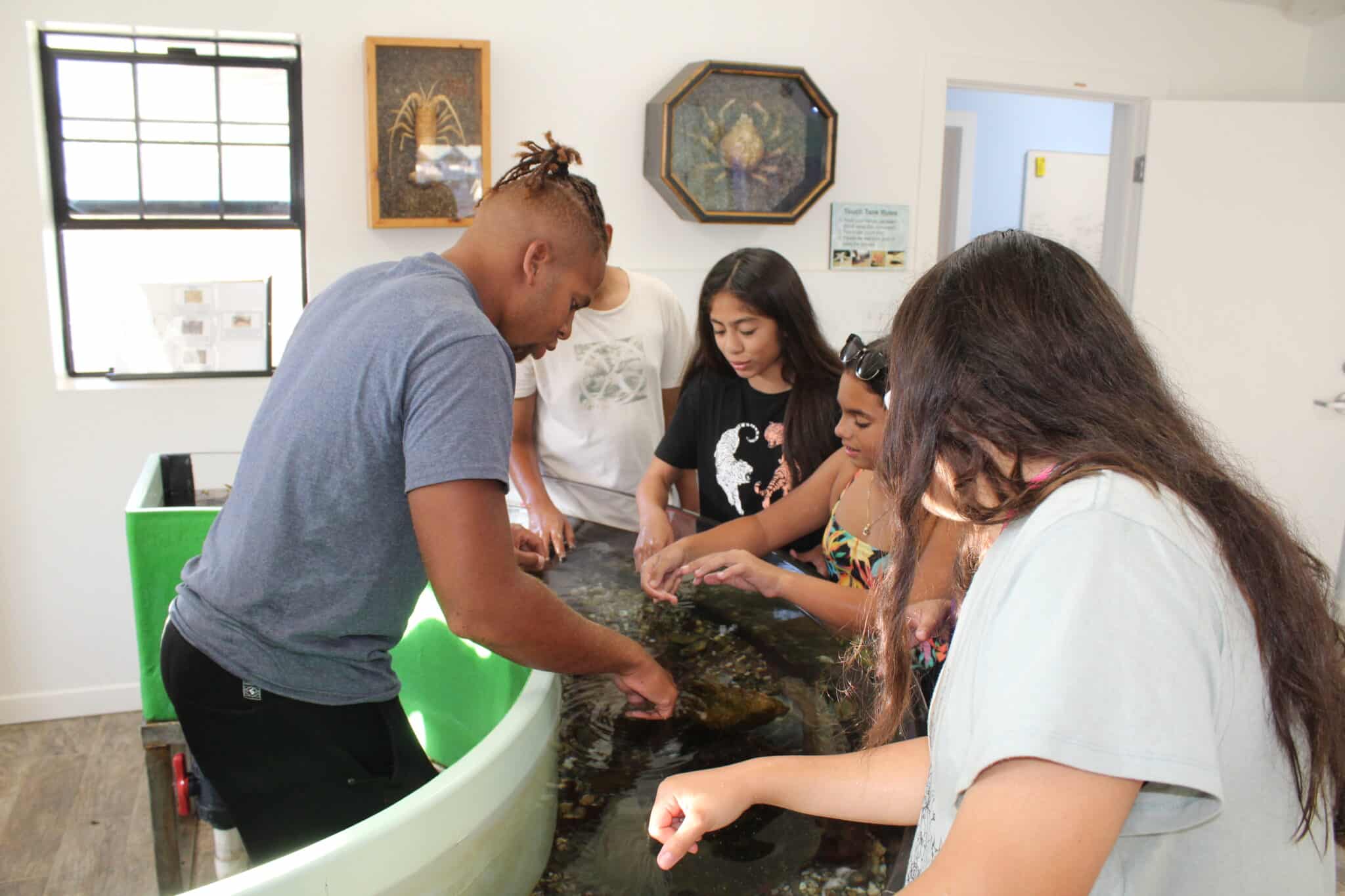
*Island Biogeography
Catalina Island provides the perfect backdrop to explore the unique and isolated ecosystems of islands. Students will examine how and why species ended up on the island and how they have adapted to living in their new homes. Island Biogeography also includes a hiking orientation with a 1.5 mile scenic “island stroll” to enjoy the views.
*Environmental Stewardship
The mission of the Outdoor Academy is to inspire the next generation of environmental stewards. During the Stewardship course, students experience stewardship on both a small and large scale. Students learn about Marine Protected Areas as a big-picture conservation method and visit the Emerald Garden to learn about small-scale composting while studying decomposers. In addition, students engage in a workshop session to identify environmental threats in their home communities and brainstorm both large- and small-scale potential solutions.
*Kelp Forest Exploration (4-hour course)
One of the world’s most productive and diverse habitats, kelp forests are home to diverse and thriving communities of fish, invertebrates, and understory algae. This half-day course allows students to explore kelp from the land and sea. The dry portion of the course includes a visit to the Pennington Marine Science Center touch tanks as well as a land-based lesson on the structure and functions of kelp. The wet portion is an exploration of the kelp forest from a kayak, paddleboard, or with a mask and snorkel. Trip Coordinators will choose their “Exploration Activity” on the Program Planner.
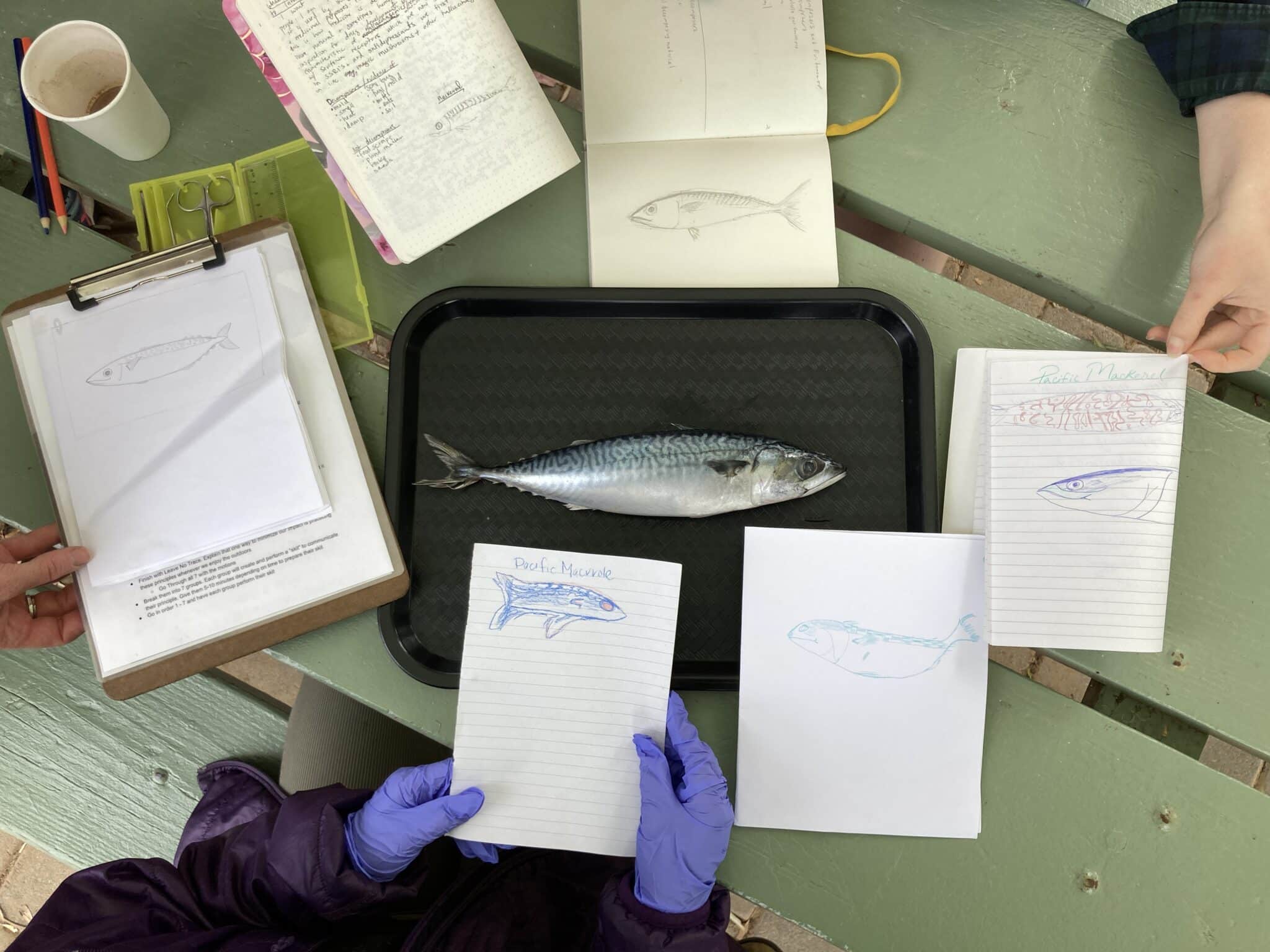
Ichthyology Lab
Globally, fish provide food for more than 1.5 billion people each year, but many people have never seen a fish in the wild. In the course, students will identify features and adaptations during a sketching and dissection session of a Pacific Mackerel.
Plankton Lab
They may be microscopic, but phytoplankton are responsible for producing up to 50% of Earth’s oxygen. Students will learn how scientists collect plankton from the ocean, will examine and identify plankton under a microscope, and will build their own plankton in a neutral buoyancy competition.
Oil Spills Cleanup Lab
Oil is one of the most widely used fossil fuels. But what happens when oil accidentally spills into the ocean? In this lab, students explore the effects of oil spills on marine environments and work in teams to test various methods used to clean it up and help ocean ecosystems recover.
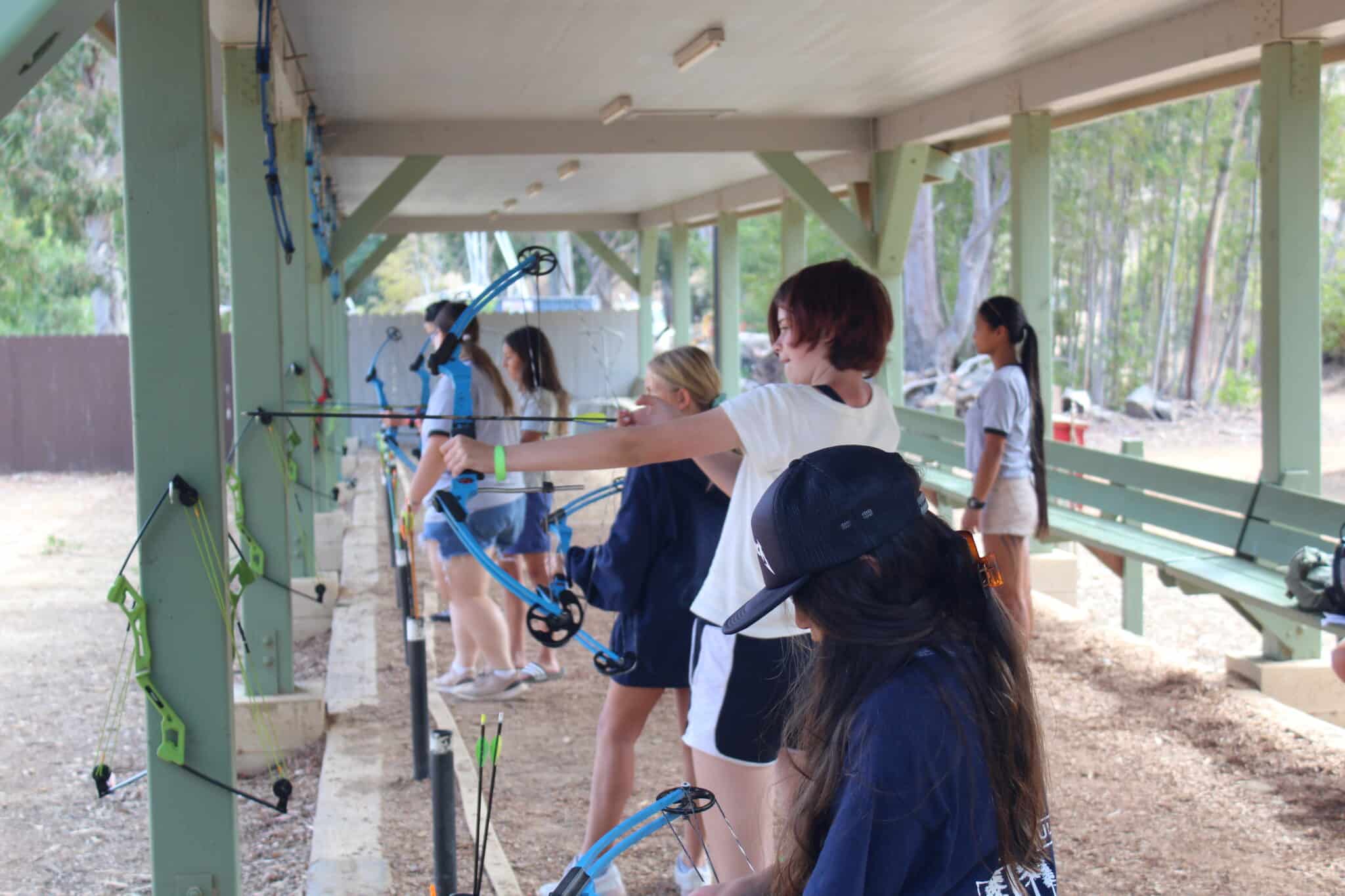
Archery
Archery is about focus and concentration. At the archery range students will exercise their growth mindset while practicing and improving skills under the supervision of the range commander.
Arrow Point Hike
Enjoy incredible views of the land and sea on a 1.5 mile hike to Arrow Point. The Arrow Point hike offers students a manageable challenge while practicing growth mindset. Student curiosity is sparked as we observe wildflowers, birds, animals, and more!
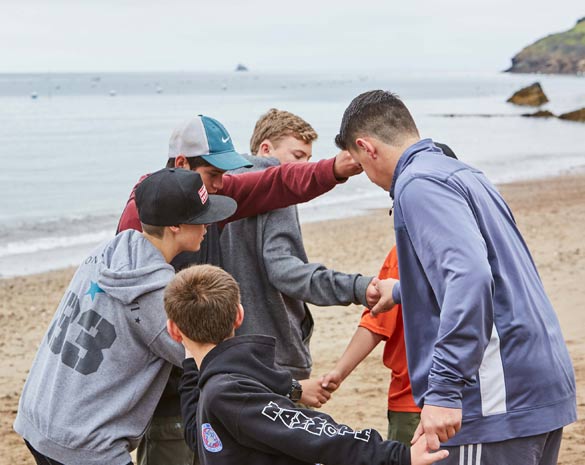
StewARTship Studio Workshop
A passion for environmental stewardship comes from a strong connection with nature, and what better way to connect with nature than through art? In StewARTship, students will use the natural inspiration of Catalina Island and create an art project with basic instruction from our staff.
Just Beach!
The typical itinerary at the Emerald Bay Outdoor Academy is packed in order to maximize your time at camp. For schools that wish to opt for more unstructured time, you can Just Beach on arrival day! After your float test, you will have all-school free time on the beach supervised by a Naturalist. Students can wade with a life jacket, beachcomb, read, or play games. During inclement weather, a sheltered location will be utilized such as the Dining Hall Porch. Note: Schools should plan to have their students spend the full time on the beach and any student leaving the waterfront will need to have a youth buddy as well as an adult chaperone.
Intertidal Zonation
When land meets sea, the changing tide creates dynamic intertidal zones, one of the harshest environments. Taught on the beach and in the Pennington Marine Science Center, students observe first-hand how ocean invertebrates have adapted to survive life on the edge.
Team Building
In their Animal Groups, students will be challenged to communicate and collaborate with each other in increasingly difficult activities.
DIY Course
Schools have the option to use a session to create their own curriculum and lead their own course. This can be used for chapel or other school-specific content.
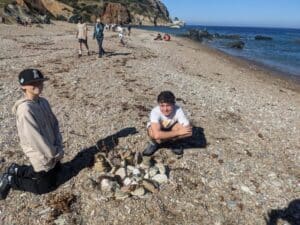
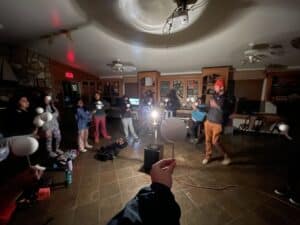
Astronomy
Since the dawn of man, humans have been captivated by the vast unknown that fills the night sky. Students will model the phases of the moon, learn how to use a planisphere to identify constellations, and take a short hike to observe the night sky.
Nocturnal Wonderland
Catalina Island leads a double life. Students will investigate why some animals wait for sundown to emerge and will go on the hunt to locate some of our nocturnal neighbors around camp while participating in activities that help them learn about nocturnal adaptations.
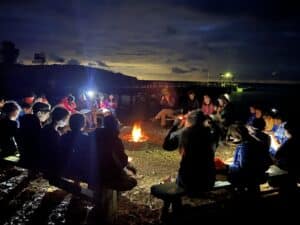
Campfire & S’mores
Our staff will build your campfire and provide the ingredients for S’mores. From there, your campfire is your time to enjoy with your school however you would like – performing skits, singing songs, sharing stories, or reflecting on your time at Emerald Bay.
Dance Party
For those schools with students that like to let loose, we will set up a dance party in the dining hall with student-appropriate music.
Movie Night
For those schools with students that still have extra energy at the end of the day, we will set up a dance party with lights and student-appropriate music.
2-Session All-School hike to Parsons Beach (Core Course for 5-Day Programs, Optional for 4-Day Programs)
Longer programs offer the ability to explore more of Catalina’s interior. During this 2-session course, Naturalists will lead students in a 2 ¼ mile round trip hike to Parsons Beach to learn more about the native ecosystems of Catalina Island, build kelp forests on the beach out of found natural materials, and participate in a guided reflection.
Additional Water Activities (Snorkel, Kayak, Paddleboard)
Students will apply growth mindset with their friends as they learn a new skill of snorkeling, paddleboarding, or kayaking in and around Emerald Bay while observing local wildlife above and below the surface of our crystal-clear water.
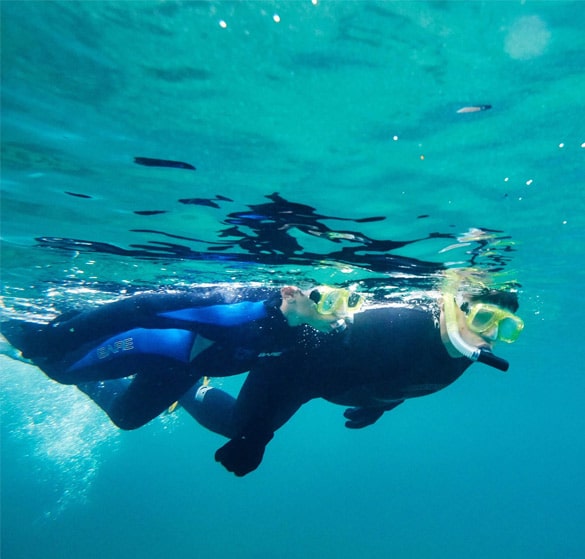
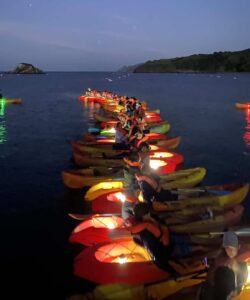
Night Kayak
What is better than paddling underneath the moon and stars? Students will enjoy a tranquil and memorable kayak trip around Emerald Bay while searching for bioluminescence and other nighttime sights.
Night Snorkel
For groups that have completed a daytime snorkel, make a return trip to Doctor’s Cove but this time – at night! In addition to the standard snorkel gear, students will also don a glow stick and a dive light for this unforgettable experience. For those students who may not be comfortable with a night snorkel, we will set up a beach campfire so they can enjoy the ambiance with their group!